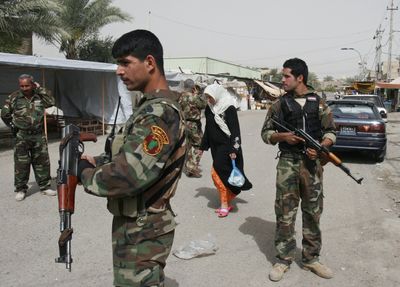Clashes follow arrest of U.S. ally in Iraq
Sunni leader accused of terrorism

BAGHDAD – American and Iraqi forces arrested an influential U.S. ally Saturday, triggering fierce clashes in central Baghdad that threatened to disrupt a key pillar of American efforts to stabilize the capital as combat forces draw down.
As Apache helicopter gunships cruised above Baghdad’s Fadhil neighborhood, former Sunni insurgents fought from rooftops and street corners against American and Iraqi forces, according to witnesses, the Iraqi military and police. At least 15 people were wounded in the gunfights, which lasted several hours. By nightfall, the street fighters had taken five Iraqi soldiers hostage.
The battles, the most ferocious in nearly a year in Baghdad, erupted minutes after the arrest of Adil Mashadani, the leader of the Fadhil Awakening Council, which is composed mostly of former Sunni insurgents who allied themselves with the U.S. military in exchange for monthly salaries that are now paid by Iraq’s government.
The formation of Awakening councils across Iraq, which include an estimated 100,000 fighters, is widely credited with bringing down levels of violence in many Sunni insurgent strongholds such as Fadhil. But mistrust has lingered between the councils and Iraq’s Shiite leaders; Saturday’s violence put on display these tensions, which appear to be deepening.
“We will fight them till the end if they don’t release him,” declared Abu Mirna, a spokesman for the Fadhil Awakening Council. As he spoke by phone, the sounds of heavy gunfire could be heard in the background.
Iraq’s chief military spokesman, Gen. Qassim Atta, said an arrest warrant had been issued for Mashadani and an aide for committing “terrorist acts.”
U.S. military commanders have expressed concern that many Awakening fighters, dubbed the Sons of Iraq by the U.S. military, could end up returning to supporting the insurgent group al-Qaida in Iraq if they feel oppressed by the government. Most Awakening groups have been transferred to Iraqi government control, much to the dissatisfaction of many of their leaders.
In recent months, Iraqi security forces have targeted dozens of Awakening leaders in Baghdad, Anbar and Diyala provinces for past crimes, fearing they could turn against them once U.S. troops withdraw. And for the past year, many Awakening commanders and fighters have expressed frustration over late salary payments and low acceptance rates into Iraq’s security forces.
On Saturday, a U.S. military spokesman said that Mashadani was not arrested for his role as an Awakening leader and that the groups were not being targeted.
Abu Mirna said it was too early to decide whether the fighters would break off their alliance with the U.S. military. But it was clear their relationship had been tainted by Mashadani’s arrest and Saturday’s clashes.
“The American forces do not have credibility with us,” Abu Mirna said. “They fought the Fadhil people. We used to call the American forces ‘the friendly forces.’ What they have done today was unexpected. What happened today will affect the trust between other Awakening groups and the Americans.”
The reaction from other Awakening leaders across Baghdad was mixed. In the former Sunni insurgent haven of Dora, Ali Hussain Hafidh, an Awakening commander, said he was alarmed by the sight of four U.S. Humvees on his street.
In Baghdad’s Adhamiyah enclave, another former Sunni insurgent stronghold, there was little support for Mashadani. “We heard that he is killing people and that he has started to take protection money from taxi drivers,” said Riad Sammarai, the deputy leader of the neighborhood Awakening. “This will never affect our relationship with the Americans.”